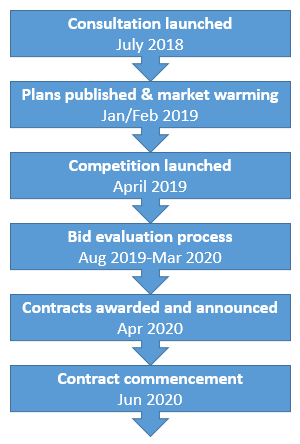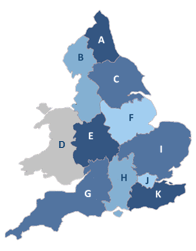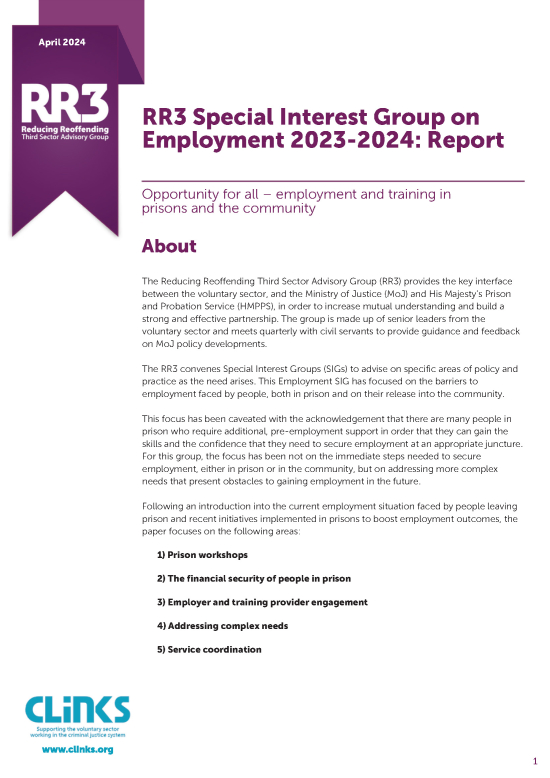The Ministry of Justice (MoJ) is expected to confirm its plans for the future structure and delivery of probation services in the New Year.
This follows the announcement in the summer that current contracts with Community Rehabilitation Companies would be terminated early in 2020. Alongside this announcement a public consultation was launched on the MoJ’s initial proposals for future probation services. You can read Clinks submission to that consultation here as well as blogs on what we heard at our consultation events, what is proposed for services for women under probation supervision and our initial thoughts on the proposals.
We recommended that the Ministry of Justice continue to engage with and consult the voluntary sector on the design of the new probation programme as it developed. We are very pleased, therefore, to have been involved in ongoing discussions with the department as they analyse the consultation responses and work up the design of the programme in England and Wales. This has enabled us to provide input and feedback based on our trackTR research and ongoing consultation with the voluntary sector. A couple of weeks ago I participated in a webinar, hosted by the MoJ, to outline these developing plans to the sector. The slides from that webinar are available here.
This blog will summarise and reflect on key points from that webinar. Due to the proposals differing in England and Wales the first part of this blog refers to England only. For details of developments in Wales please see the specific section below.
Timeline (for England only)

The structure of probation services
The Ministry of Justice is still proposing, as set out in the initial consultation document, that there will be 10 contract package areas which will create co-terminosity, or overlap, between the National Probation Service (NPS) and new contracted providers.

The MoJ proposed a new regional authority in the original consultation. It has provided more information on the regional authority’s proposed responsibilities. It will:
- Provide regional leadership, set the strategic plan and coordinate delivery
- Undertake contract management and ensure standards are met by the NPS and new contracted probation providers
- Have overarching responsibility for probation services
- Ensure that the needs of service users are well understood by stakeholders.
- Focus on ensuring the NPS and contracted provider in their region meet the required standards
- Be able to work with other stakeholders to promote new approaches to support people on probation.
Voluntary sector engagement with the regional authority and National Probation Service
Regional commissioning budget
The Ministry of Justice is exploring a usable (but affordable) budget held by the regional authority to support better services, encourage joint working, and innovation. This Regional Commissioning Budget (RCB) would not be used for services essential to sentence delivery, which the NPS and contracted probation provider will be responsible for, but for supportive and enabling services and to encourage joint partnership working.
The ‘rate card’ and a ‘panel of specialist providers’
Since the publication of our trackTR final report, and throughout the MoJ’s consultation process, we have been in discussions with the MoJ about our recommendation that the rate card ─ the mechanism by which the NPS is currently able to access voluntary sector services ─ be abandoned. The current thinking is that a revised rate card will exist through which the NPS will source interventions from contracted providers – when the needs of, and solutions for, their service users are common.
However, there is recognition that the needs of NPS service users aren’t always the same as those of low-medium risk people who will be managed by the contracted providers. The MoJ is therefore considering establishing a separate sourcing mechanism through which the NPS will be able to access these services. This ‘Panel of specialist providers’ will allow the NPS, where necessary, to procure services for work (excluding Unpaid Work and Accredited Programmes) from the sector directly.
Suppliers will be able to qualify to be on the panel at any point in time and indicate what needs (e.g. lifestyle and associates, employment, etc.), groups of people (e.g. women, black, Asian and minority ethnic etc.) and geographical areas they will be able to serve. Every time a new requirement arises, a mini-competition will take place with pre-qualified suppliers followed by a contract or grant being awarded for the delivery of the service. The panel will act as a market place for buying and selling services for rehabilitation. Access could be given to other commissioning bodies including HM Prisons as well as Police and Crime Commissioners and local authorities.
A strategy for involving the sector in providing contracted probation services
The Ministry of Justice commercial team has developed a voluntary sector strategy to enable the participation of voluntary organisations in the delivery of contracted probation services in England. As far as we are aware this is the first time a specific strategy for the voluntary sector has been developed for the procurement of public services and we are really pleased to have been able to provide feedback to the MoJ as it has developed.
The overall aim of the strategy is to remove barriers to voluntary organisations bidding to deliver probation services as primes in the future, and to enable smaller voluntary organisations to be part of the supply chain. The strategy includes:
Procurement approach
- At prime level, the MoJ is considering the level of the Parent Company Guarantee that will be required for the voluntary sector, and potential alternatives that might be more achievable.
- The MoJ plans to utilise the Social Value Act in procurement decisions.
- At sub-contractor level, the MoJ is not planning to mandate a specific level of spend on the voluntary sector but plans to design contract requirements to encourage involvement, including focus on specific cohorts. We hope to continue to engage with the MoJ on this to ensure the criteria used to assess bids is as effective as possible in encouraging voluntary sector involvement.
- In order to address concerns from the sector about being used as ‘bid candy’ in the past, the MoJ will require bidders to detail subcontractors in their bids and will contractualise those commitments.
- The MoJ also plans to test bidders’ past experiences of working with the voluntary sector.
Contract management
Clinks is very pleased to see many of our trackTR recommendations on transparency included in the strategy.
- Information will be publically available about who’s in supply chains, what they’re delivering and how much they’re paid
- Changes to material subcontractors will require approval
- In response to feedback regarding the onerous nature of the Industry Standard Partnering Agreement and fact that, in reality, it has provided little protection for organisations, the MoJ proposes to replace it with a simpler set of market stewardship principles.
- The MoJ is proposing an escalation route to allow sub-contractors to raise issues regarding market stewardship with Her Majesty’s Prison and Probation Service (HMPPS).
What do voluntary sector organisations need to do to prepare for these changes?
- Register for Clinks probation review events. As part of the Ministry of Justice’s market warming, Clinks is hosting events in February for the voluntary sector to hear more about the MoJ’s final plans.
- Register your organisation on Clinks directories.
The MoJ plans to signpost prime bidders to Clinks’ directories of voluntary sector organisations working in the criminal justice system in order to identify potential supply chain partners. If you are interested in being involved in supply chains for the delivery of the new probation contracts make sure your organisation is registered and your details are up to date.
What about Wales?
The consultation proposed an alternative delivery model in Wales, with NPS in Wales assuming responsibility for the management of all people – high, medium and low-risk of offending – so that advice to court, risk and need assessments, sentence planning and managing enforcement and recall will all sit within a single organisation.
HMPPS Wales is progressing plans for this and also considering how the provision of additional services and interventions can be put out to tender to enable a range of providers and voluntary sector organisations to compete to deliver them. They are currently considering three approaches to commissioning which are set out in this presentation. HMPPS Wales plans to launch the competition in the first half of 2019 but it will likely be slightly later than in England and their preferred approach will be shared prior to this.
Watch out for further blogs and details in Light Lunch where we will continue to share information as it becomes available.

